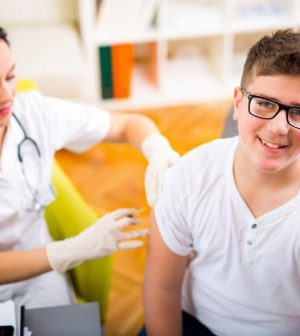- Recognizing the Signs of Hypothyroidism
- 10 Strategies to Overcome Insomnia
- Could Artificial Sweeteners Be Aging the Brain Faster?
- Techniques for Soothing Your Nervous System
- Does the Water in Your House Smell Funny? Here’s Why
- Can a Daily Dose of Apple Cider Vinegar Actually Aid Weight Loss?
- 6 Health Beverages That Can Actually Spike Your Blood Sugar
- Treatment Options for Social Anxiety Disorder
- Understanding the Connection Between Anxiety and Depression
- How Daily Prunes Can Influence Cholesterol and Inflammation
Half of U.S. Teens Plan to Get COVID Shot, But Can Numbers Go Higher?

Vaccine advocate Ethan Lindenberger, now 20, had to wait until age 18 to get the vaccinations that he knew he needed to protect his health.
“I knew growing up my mom was very anti-vaccine. Because of the legal restrictions, I really wasn’t trying to fight her on getting me vaccinated,” Lindenberger recalled. “She believed vaccines could kill me, and so it was not going to be an easy time.”
Kids like Lindenberger face the same dilemma in the coronavirus pandemic, with pressure mounting to get as many people as possible vaccinated to reach herd immunity against the new coronavirus. A survey conducted in April found 52% of American teens saying they’d like to get the shots.
But in many cases, their parents may not support that decision.
That’s why some experts are now arguing that states should revisit parental consent requirements for vaccines, and allow teens to make their own choice when it comes to immunizations.
Many teens “understand the biology. They understand the risks and benefits. And they may have parents who don’t,” said Dominic Sisti, director of the Scattergood Program for the Applied Ethics of Behavioral Health Care at the University of Pennsylvania.
“We want to give those teens a chance to be protected. They shouldn’t have to wait until they’re 18 to do the right thing,” Sisti said.
In a recent opinion piece in the journal JAMA Pediatrics, Sisti and others made the case that children as young as 12 should be allowed to choose for themselves to get the COVID-19 vaccine.
Their argument comes as the United States reaches yet another turning point in the pandemic saga, with the rapid spread of the highly infectious Delta variant.
Teen vaccinations are needed to help the entire country stem the spread of the Delta variant, as available vaccines have been shown to protect even against the new variant.
But a survey released earlier this month found that only 56% of parents who have unvaccinated teens plan to let them get the COVID-19 vaccine. The survey appeared in the Morbidity and Mortality Weekly Report, published by the U.S. Centers for Disease Control and Prevention.
“These adolescents, these young adults almost, ought not be placed in a situation where they are placed in preventable risk,” Sisti said.
Sisti and his colleagues argue that a handful of states already allow minors to consent to immunizations that might make parents uncomfortable, such as for sexually transmitted infections like human papillomavirus (HPV) and hepatitis B.
Some states even allow minors to consent to any medical intervention, including vaccines, they added.
According to Larissa Morgan, former editor-in-chief of The Regulatory Review at the University of Pennsylvania’s Carey Law School, “What we’re proposing is pretty much aligned with what some states have done, in terms of other vaccines. Minors in some states are allowed to consent to different health services that are quite individualized and don’t even affect public health, whereas this is something that has an extraordinary impact on public health,” she said of the COVID-19 vaccine.
Sisti and Morgan said minors aged 12 to 14 should be allowed to consent to vaccination with support and facilitation from their doctors or other trusted adults in their lives. Parents should be notified, unless notification would pose a risk to the child.
Teens 15 and older should be able to get vaccinated without either parental consent or notification, they added, pointing out that the law generally recognizes age 14 as the time where developing young minds become able to engage in competent adult decision-making.
“The COVID vaccine being so high benefit and so low risk makes a very compelling case for allowing adolescents to do what is in their best interest when their parents are failing to do so,” Sisti said. “As a society, I think we need to protect kids whose parents aren’t up to speed or well-educated about the safety and efficacy of vaccines.”
Withholding notification can be an important step in protecting kids who choose to go against their folks and get the vaccine.
Lindenberger noted that some teens risk a lot in defying their parents to protect their own health.
“If you are worried about serious consequences — your parents not trusting you, your parents taking away your phone or kicking you out — those are serious concerns for some young people,” Lindenberger said, advising kids about talking to their parents. “Maybe wait and weigh those consequences seriously. It’s not as easy as ‘Go get vaccinated, and then deal with it later.'”
The COVID-19 vaccination rate among teens also could be boosted by allowing school nurses to administer vaccines, installing vaccine navigators to help teens find the jab they want, and even by having large-scale vaccine drives at local schools, Sisti and Morgan said.
The goal of all this would be “making it as easy as possible so they can access the vaccination in a way that is safe for them and confidential,” Sisti said.
More information
The U.S. Centers for Disease Control and Prevention has more about COVID-19 vaccines for children and teens.
SOURCES: Dominic Sisti, PhD, director, Scattergood Program for the Applied Ethics of Behavioral Health Care, University of Pennsylvania, Philadelphia; Larissa Morgan, JD, editor-in-chief, The Regulatory Review, University of Pennsylvania’s Carey Law School, Philadelphia; JAMA Pediatrics, July 12, 2021; Morbidity and Mortality Weekly Report, July 9, 2021
Source: HealthDay
Copyright © 2026 HealthDay. All rights reserved.










